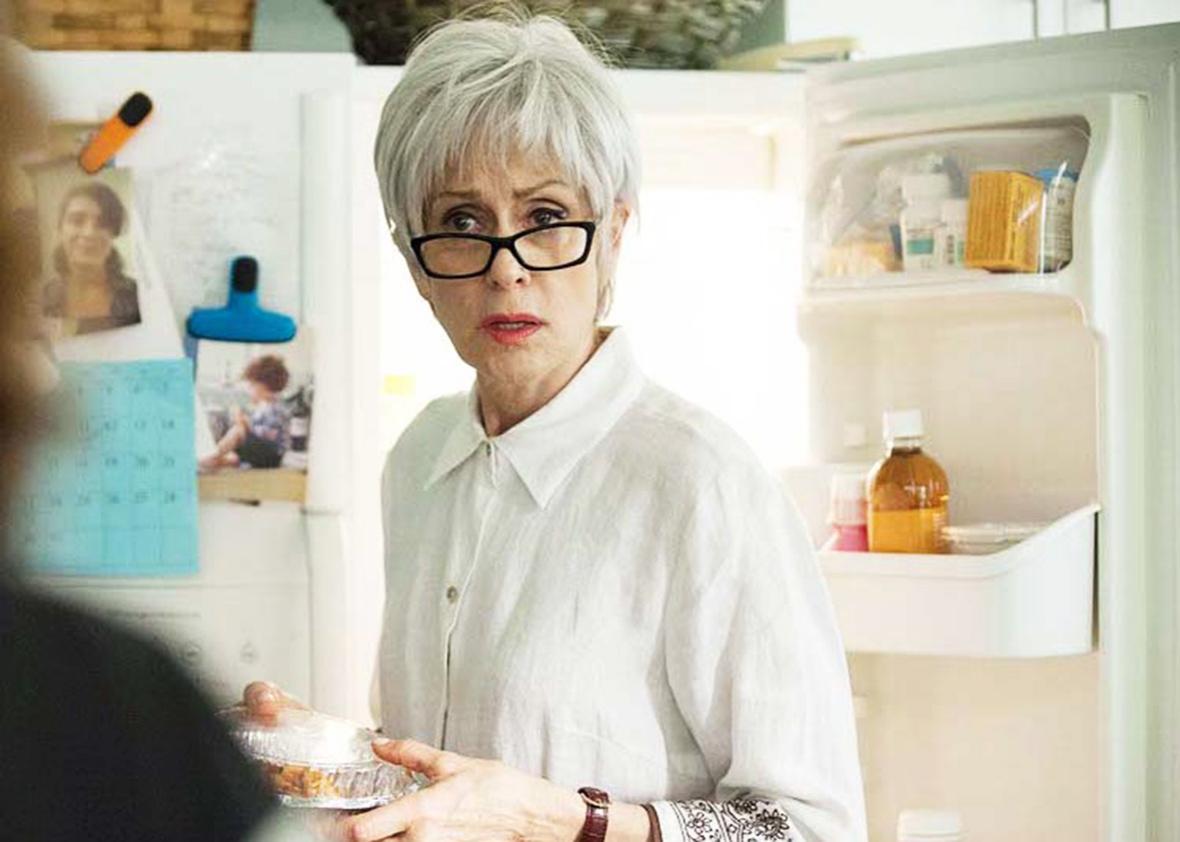The Jewish mother—that nervous, guilt-inducing, overbearing creature exaggerated and popularized by Philip Roth and Woody Allen—no longer poses a threat to Jewish women. Time, along with feminism and assimilation, has defanged the stereotype, morphing her from tragicomic to anachronistic. Women continue to identify as Jews and continue to have children, but no longer do many of us consider ourselves Jewish mothers. We’re just mothers who are Jewish.
In fact, the Jewish mother figure has become so irrelevant that I’ve begun to develop a nostalgia for her, along with a growing admiration for her brassy ways. The Jewish mother approached child-rearing with a brutal honesty. She refused to pretend that her love for her children wasn’t all-consuming. Raising her kids was the biggest power afforded her by the patriarchy, and she wasn’t going to take the role lightly. Her use of irony was masterful—what, you think those Borscht Belt comedians invented sarcasm on their own? And the food. There’s no nostalgia for the Jewish mother without a longing for a table cluttered with dishes of too-salty, too-sweet, or—the finest variety—too-salty-and-too-sweet Ashkenazi cuisine. For decades after the Jewish mother began to disappear in the real world, at least she could still easily be found onscreen; now she’s hard to find there as well, apart from the cynical interpretation of her, played by Judith Light, in Transparent.
Until I read two recent books on Jewish parenthood, my nostalgia felt like enough. I had no instinct to take back the Jewish mother or find a way to fit two big and satisfying parts of my identity—mother and Jew—together. As my grandmother Esther, a Jewish mother who never failed to inject gritty existentialism into all her worrying and meddling, would say: “For who? For what?”
An implicit answer to Esther’s question comes from Marjorie Ingall in Mamaleh Knows Best: What Jewish Mothers Do to Raise Successful, Creative, Empathetic, Independent Children. Cut from a similar, though far more forgiving, cloth as Amy Chua’s Battle Hymn of the Tiger Mother and Pamela Druckerman’s Bringing Up Bébé, Ingall outlines the values and habits common among Jewish parents and explains why they lead to great kids. Her formula includes encouraging independence, self-control, geekiness, kindness, and perhaps most importantly, a healthy distrust of authority.
This last bit isn’t some progressive fantasy of Judaism but a core tenet of Jewish thought. One example: The Talmud includes a centuries-old story about a rabbi challenging God, and God replying, with a grandfatherly chuckle: “My children have defeated me.” Another example: the tradition of Jewish mother jokes that emerged during the 20th century. “What’s the difference between a Rottweiler and a Jewish mother? Eventually, the Rottweiler lets go.” Such humor is clearly the product of men and women raised to believe that nothing, and no one, is off-limits.
At times, I felt uncomfortable with Ingall’s emphasis on Jewish greatness in Mamaleh Knows Best, although I understand one can’t argue for a parenting style without offering some evidence of its promises. Ingall offers a send-up of the Levy’s rye bread slogan: “You don’t have to be Jewish to be a Jewish mother,” which is sweet but not entirely convincing. Just like it would be difficult for me to bring up bébé outside of France, it would be difficult to raise a Jewish child outside the context of a Jewish community, secular or religious.
But this doesn’t mean readers shouldn’t try. Out of all of Ingall’s mandates on parenting, the one worthiest of our deference is to teach children to question authority, including their parents. Doing so helps cultivate independent thinkers who are more likely to succeed, not to mention are just great to have around. Ingall’s relationship with her daughters is an enviable one: These young women sound skeptical, thoughtful, and sincere—exactly the kind of people I’d like to have dinner with on a regular basis. The pleasures that Ingall takes in raising her girls far transcend kvelling; her daughters have challenged and changed her for the better.
Ingall aims to re-envision Jewish motherhood as a source of enrichment for women, an ambition shared by Danya Ruttenberg’s Nurture the Wow: Finding Spirituality in the Frustration, Boredom, Tears, Poop, Desperation, Wonder, and Radical Amazement of Parenting. Ruttenberg is a rabbi, and her book is an inquiry into the spiritual nourishment that raising young children offers parents, as well as an attempt to uncover what Judaism can tell us about parenting. For Ruttenberg, parenting struggles such as managing tantrums are an opportunity to work on our ability to see someone in their “I and Thou” wholeness and fullness. In her opinion, such moments rival deep prayer in their ability to force us to reckon with the power of life and the mysteries of the universe.
I was moved by Ruttenberg’s framing of care work as a portal to the transcendent, just as was I touched by Ingall’s long-overdue analyses of what makes Jewish mothering both distinct and effective. It wasn’t enough to suck all of the venom out of the Jewish mother label for this 21st-century mother who is also Jewish. But I was left with a newfound appreciation for the many ways in which Jewish me and mother me speak to each other.
More important than how these books influenced my self-regard, however, is how they made me think and feel about my mother, grandmother, aunts, and great-aunts: all audacious and nervous Jewish mothers of varying degrees. Ingall and Ruttenberg’s books also work as revisionist histories, revealing how—despite the widely aired frustrations of a few famous sons—Jewish mothers were good at parenting and probably got a lot out of it, too. I might not be a Jewish mother, but reading these books made me glad to have been born of one.
